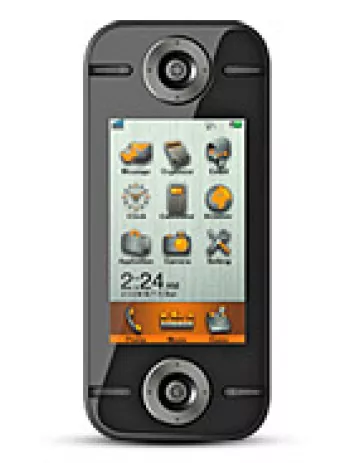
Introduction to the Micromax X550 Qube
The Micromax X550 Qube, launched in 2010, was an innovative mobile device reflecting the transitional period from basic feature phones to more advanced smartphones. With its unique cube-like interface and essential features, it catered to users seeking an affordable, touch-enabled mobile experience. Below, we delve into its various aspects, including design, display, camera, performance, and connectivity.
Design and Build
The Micromax X550 Qube presents a compact and lightweight design, with dimensions measuring 112.5 x 55.9 x 14.1 mm and weighing only 85 grams. This makes it incredibly portable and easy to handle. Its mini-SIM slot further simplifies the design while keeping the phone's form factor efficient for everyday use. The phone is available in a classic black color, adding a sleek aesthetic suitable for various user preferences. The build quality, typical of the era, focused on durability, with plastic materials forming a sturdy shell to protect the internal components.
Display Features
The phone features a 3.2-inch TFT resistive touchscreen with a 256K color display. Its resolution of 240 x 400 pixels provides a decent viewing experience with a pixel density of approximately 146 ppi. While not HD by modern standards, at the time of its release, the display was considered satisfactory for viewing photos, videos, and navigating the cube interface. The touch interface, albeit resistive, supports basic touch controls, enhancing user interaction with the device.
Camera Capabilities
The Micromax X550 Qube is equipped with a single 2 MP rear camera capable of capturing basic photos and videos. While the camera does not support advanced features like autofocus or LED flash, it is sufficient for casual photography and video recording needs. In an era where camera phones were just gaining traction, the inclusion of a camera at this price point was a significant advantage for users.
Performance and Operating System
Operating as a feature phone, the Micromax X550 Qube functions within a simpler software environment compared to smartphones. It does not have a specific OS per se but supports basic functions such as calling, texting (SMS, MMS), and emailing. The phone includes Java support, allowing for the installation of MIDP 2.0 applications and games, which broadens its usability beyond communication.
Storage and Memory
The device includes a microSDHC card slot, enabling users to expand storage capacity to accommodate more media and applications. With a phonebook capacity of up to 1000 entries with Photocall features, the Micromax X550 ensures that users can save extensive contact information. The ability to track call records further supplements its utility in everyday communication activities.
Battery Life
A removable Li-Ion 1200 mAh battery powers the device, providing up to 8 hours of talk time and 144 hours of standby time. This performance is reasonable given the phone's feature set and lightweight construction. The removable nature of the battery allows users to easily replace it if necessary, extending the phone's life cycle.
Network and Connectivity
The Micromax X550 Qube operates on GSM technology, supporting GSM 900 and 1800 frequency bands. It offers GPRS Class 10 connectivity but lacks EDGE support, indicative of its positioning during its release period. The absence of WLAN (Wi-Fi) is notable but expected given its feature phone classification. Nevertheless, it includes Bluetooth 2.0 with A2DP for wireless audio streaming and file transfers. Stereo FM radio adds an entertainment value, complemented by a 3.5mm audio jack for personal listening via headphones.
Additional Features
Other notable features include a basic WAP 2.0/xHTML browser, featuring Opera Mini for internet browsing needs. While limited compared to modern browsers, it offers essential functionality for accessing web pages. The device supports downloadable games, enhancing its entertainment potential, while its stereo loudspeaker provides adequate audio output for media consumption without external accessories.
Conclusion
The Micromax X550 Qube stands as a testament to the transitional mobile technology landscape of the early 2010s. With its unique interface, basic multimedia capabilities, and affordable pricing (approximately 50 EUR at launch), it provided an accessible entry point for users looking to experience touchscreen technology without the cost barrier of full-fledged smartphones. Though discontinued, the X550's impact is still remembered by those who appreciated its blend of functionality and innovative design amidst an evolving technological era.
Main Features of Micromax X550 Qube
- Lightweight design, weighing only 85 grams (3.00 oz).
- 3.2 inches TFT resistive touchscreen with 256K colors.
- The phone supports a dedicated microSDHC card slot for expandable memory.
- 2 MP main camera with video recording capability.
- Stereo FM radio feature.
- Bluetooth 2.0 with A2DP support.
- Removable Li-Ion 1200 mAh battery providing up to 8 hours of talk time.
- Standard 3.5 mm audio jack for headphones.
- Affordable pricing around 50 EUR.
Micromax X550 Qube Drawbacks
- Lacks 3G and 4G network support, which limits internet browsing speed to 2G (GPRS).
- No EDGE support, further limiting data transmission speeds.
- Discontinued model, meaning it may have limited support and availability.
- Uses resistive touchscreen technology, which is less responsive compared to capacitive touchscreens.
- No front (selfie) camera available for video calls or selfies.
- Absence of WLAN (Wi-Fi) means no wireless internet access unless through mobile data.
- Lacks GPS functionality, affecting location-based services.
- Small screen-to-body ratio (approximately 46.3%), resulting in less viewing area.
- Low display resolution (240 x 400 pixels) which may affect image and video clarity.

View Also
More Phones
All Rights Reserved +14266 Phones © Mobilawy 2025

























